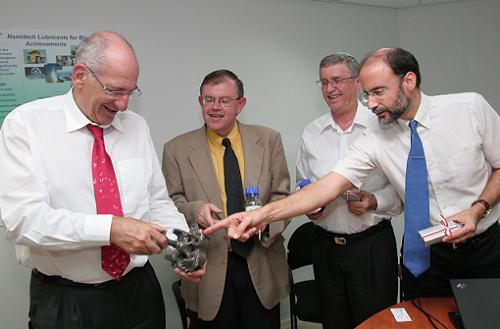Pascal Kushpa, the minister in charge of internal affairs (including science) in Switzerland visited the nanotechnology company ApNano Materials in Nes Ziona

Pascal Kushpa, the minister in charge of internal affairs (including science) in Switzerland, visited the development center of the nanotechnology company ApNano Materials in Ness Ziona at the head of a delegation of senior industrial and academic personnel from Switzerland.
Minister Kushpa reviewed NanoLub - the nanotechnological dry lubricant of ApNano Materials. The revolutionary material was presented by the company's managers: Aharon Feuerstein - Chairman and CFO, Dr. Menachem Ganot - CEO, and Dr. Niels Fleischer - Vice President for Business Development and Product Development.
"I was impressed by the ApNano Materials company and I hope it will succeed because it will help humanity" said Minister Kushpa.
NanoLub is based on revolutionary sphere-like particles made of special metal compounds. In the professional jargon they are called inorganic fullerenes. The revolutionary lubricant works through a special mechanism that can be modeled into millions of tiny bearings, resulting in a significant reduction in wear and tear.
The material of ApNano Materials is based on a breakthrough in the field of nanotechnology carried out at the Weizmann Institute by a group led by Prof. Rashef Tana, currently head of the Department of Materials and Surfaces. Dr. Menachem Ganot, currently the CEO of the company, was a researcher in the group and the one who synthesized the new material for the first time within the research group.
Recently, the particles have been recognized as an excellent shielding material, one of the strongest in the world. The experiments were carried out by a research team led by Prof. Yan Qiu Zhu from the Department of Mechanics, Materials and Production Engineering of the University of Nottingham in England. The results were published in the scientific journal Advanced Materials in June 2005. The inorganic fullerenes are twice as strong as the best shielding materials in use, such as boron carbide and silicon carbide, and are 4-5 times stronger than steel.
The special properties of the inorganic fullerenes arouse great interest in industry around the world. To date, the company has already created the material at its facility in the Weizmann Science Park in Nes Ziona. Today, the company is before the construction of a semi-industrial facility that will produce between 100 and 200 kg per day. After that, an industrial facility will be built that will produce tons of the material every day." The company received letters of intent from global manufacturers of lubricants to supply thousands of tons of the material per year.
ApNano Materials was recently selected by Red Herring magazine as one of the 100 most innovative and promising companies.
ApNano Materials (www.apnano.com) is a private company founded in 2002 by Dr. Menachem Ganut who serves as the CEO of the company and Mr. Aharon Feuerstein who serves as the Chairman of the Board of Directors and CFO. The company was incorporated in the USA and its development center - Nanomaterials Ltd. - is located in the science park in Ness Ziona. The company received from "Yida Research and Development Ltd", the commercial arm of the Weizmann Institute, an exclusive license for the production, transfer to commercial channels and sale of the new nanotechnological materials. The Israeli subsidiary - Nanomaterials Ltd. is fully owned by the parent company. The shareholders of ApNano Materials, besides the founders, are the venture capital fund Newton Technology Ventures, Yeda Research and Development Ltd. - the commercial arm of the Weizmann Institute, and AYYT Technological Applications and Date Update - the commercial arm of the Technological Academic Institute in Holon and private investors.
